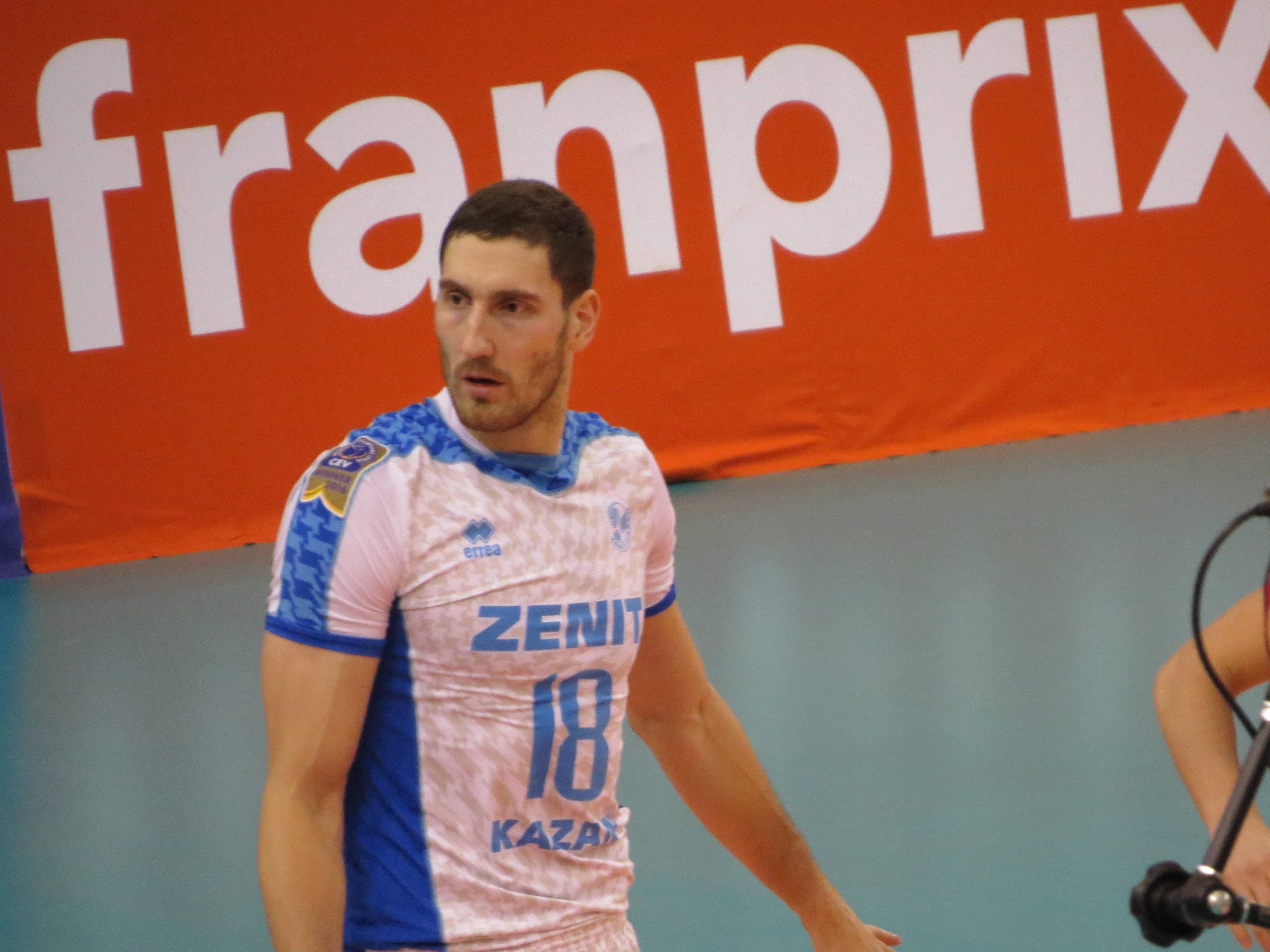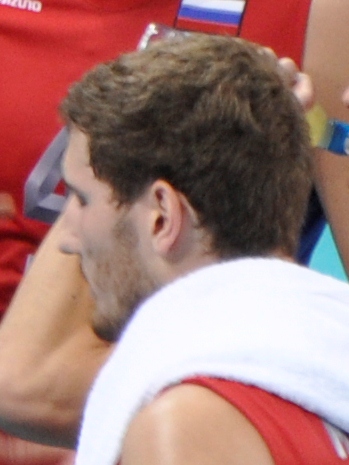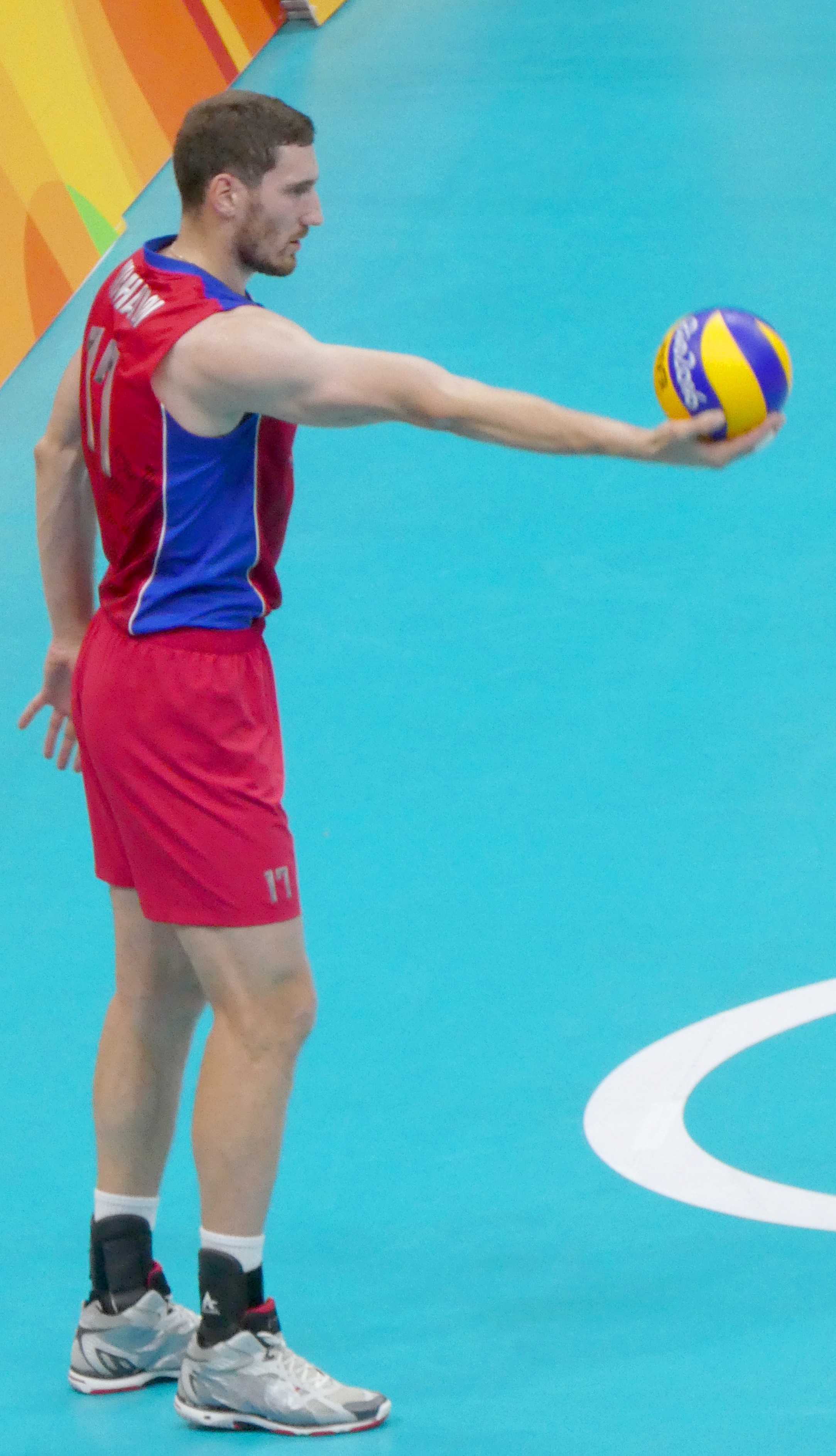1. Early Life and Career Beginnings
Maxim Mikhaylov's journey in volleyball began in the Leningrad Oblast region, where he received his early training and entered the world of professional volleyball.
1.1. Childhood and Youth Career
Maxim Mikhaylov was born on 19 March 1988, in Kuzmolovsky, Leningrad Oblast, Russian SFSR, Soviet Union. He spent his childhood and adolescence living in the city of Yaroslavl. Standing at 6.6 ft (2.02 m) and weighing 227 lb (103 kg), Mikhaylov possessed a strong physical presence, with a spike reach of 142 in (360 cm) and a block reach of 134 in (340 cm). He started playing volleyball under the guidance of coach Valery Besprozvannykh. Mikhaylov began his professional club career in 2003 by joining Yaroslavich Yaroslavl, a team competing in the Russian Volleyball Super League.
During his youth and junior career, Mikhaylov was a key player for the Russian national teams. He earned a gold medal at the 2005 FIVB Volleyball Boys' U19 World Championship and followed this success with another gold medal at the 2006 Men's Junior European Volleyball Championship. In 2007, he helped the team secure a silver medal at the 2007 FIVB Volleyball Men's U21 World Championship, where he also received an individual award as the Best Server.
1.2. Professional Debut and Early Club Career
Mikhaylov's professional career officially began in 2003 when he joined Yaroslavich Yaroslavl, which at the time was also known as Stroytel Yaroslavl (2003-2005) and later as Neftekhimik Yaroslavl (2005-2008) before reverting to Yaroslavich Yaroslavl (2008-2010). Throughout his tenure with the Yaroslavl-based club, he primarily played as an outside hitter. He distinguished himself as a prolific scorer, becoming the top scorer in the Russian Super League for three consecutive years from 2008 to 2010. His strong performances with Yaroslavich Yaroslavl attracted attention from major clubs, leading to his eventual transfer to VC Zenit-Kazan in 2010.
q=Kuzmolovsky, Yaroslavl|position=right
2. Club Career
Mikhaylov has had a distinguished career with two major clubs, Yaroslavich Yaroslavl and Zenit Kazan, achieving numerous titles and individual honors.
2.1. Yaroslavich Yaroslavl (2003-2010)
From 2003 to 2010, Maxim Mikhaylov played for Yaroslavich Yaroslavl, which underwent name changes during his tenure, being known as Stroytel Yaroslavl (2003-2005) and Neftekhimik Yaroslavl (2005-2008). He consistently played as an outside hitter and was recognized for his offensive prowess. Mikhaylov was the leading scorer in the Russian Volleyball Super League for three consecutive seasons, from 2008 to 2010, showcasing his importance to the team's offense.
2.2. Zenit Kazan (2010-present)
In 2010, Mikhaylov made a significant move to VC Zenit-Kazan, a powerhouse in Russian volleyball, which had already secured two consecutive league titles prior to his arrival. With Zenit Kazan, he transitioned into the role of an opposite hitter and has since achieved remarkable success.
His extensive list of achievements with Zenit Kazan includes:
- CEV Champions League**: Mikhaylov has been instrumental in Zenit Kazan's dominance in Europe. He won the CEV Champions League title five times in the seasons 2011-12, 2014-15, 2015-16, 2016-17, and 2017-18. He also secured a silver medal in the 2010-11 season and a bronze medal in 2012-13, as well as another silver in 2018-19. His individual contributions were recognized with the Best Scorer and Best Server awards in the 2011-12 CEV Champions League. He was named the Best Opposite Spiker in 2014, 2015, and 2016 editions, and was awarded the Most Valuable Player (MVP) in both the 2016-17 and 2017-18 finals.
- FIVB Volleyball Men's Club World Championship**: With Zenit Kazan, Mikhaylov earned a gold medal at the 2017 tournament. He also won silver medals in 2015 and 2016, and bronze medals in 2011 and 2019. In 2011, he was named the Best Scorer of the tournament.
- Russian Super League (National Championship)**: Mikhaylov has won the Russian Championship numerous times with Zenit Kazan, including titles in 2010-11, 2011-12, 2013-14, 2014-15, 2015-16, 2016-17, and 2017-18. He also achieved a bronze medal in 2012-13 and a silver medal in 2018-19. He was named the Russian Championship MVP in the 2016-17 season.
- Russian Cup**: He has lifted the Russian Cup multiple times (2013-14, 2014-15, 2015-16, 2016-17, 2017-18), along with a bronze in 2010 and 2013, and a silver in 2012.
- Russian SuperCup**: Mikhaylov also holds several Russian SuperCup titles (2010, 2011, 2012, 2015, 2016, 2017).

q=Kazan|position=left
3. National Team Career
Maxim Mikhaylov has been a vital part of the Russian men's national volleyball team, contributing significantly to their success in various international competitions at both youth and senior levels.
3.1. Youth and Junior National Teams
Mikhaylov's international career began early with the Russian youth and junior national teams. He secured a gold medal at the 2005 FIVB Volleyball Boys' U19 World Championship. This was followed by another gold at the 2006 Men's Junior European Volleyball Championship. In 2007, he earned a silver medal at the 2007 FIVB Volleyball Men's U21 World Championship, where he also distinguished himself individually by receiving the Best Server award.
3.2. Senior National Team (2008-present)
Maxim Mikhaylov made his debut for the senior Russian national team on 14 June 2008, during the 2008 FIVB Volleyball World League Intercontinental Round match against South Korea in Suwon. He immediately contributed to the team's success, helping Russia secure a bronze medal in the 2008 World League, where he was ranked 3rd in Best Spiker and 6th in Best Scorer categories.
His first Olympic appearance came at the 2008 Beijing Olympic Games, where, at just 20 years old, he played a crucial role as the team's opposite hitter, contributing to Russia's bronze medal finish.
In 2010, Mikhaylov helped Russia achieve a silver medal in the 2010 FIVB Volleyball World League, where he was recognized as both the Best Scorer and Best Spiker. Despite Russia finishing 5th at the 2010 FIVB Volleyball Men's World Championship, Mikhaylov once again received the Best Spiker award.
The year 2011 marked a highly successful period for Mikhaylov and the Russian national team. They won the 2011 FIVB Volleyball World League title after a nine-year drought, with Mikhaylov earning the Most Valuable Player (MVP) and Best Blocker awards. He also contributed to Russia's gold medal victory at the 2011 FIVB Men's World Cup, where he was named the tournament's MVP. Furthermore, at the 2011 Men's European Volleyball Championship, he was honored as both the Best Scorer and Best Spiker.
At the 2012 London Olympic Games, Mikhaylov was a driving force behind Russia's gold medal triumph. His exceptional performance earned him the Best Scorer and Best Spiker awards for the tournament.

In 2013, Mikhaylov continued his winning streak with the national team, securing gold medals at both the 2013 FIVB Volleyball World League and the 2013 Men's European Volleyball Championship, where Russia defeated Italy 3-1 in the final. He also secured a silver medal at the 2013 FIVB Volleyball Men's World Grand Champions Cup.
Mikhaylov faced significant injury setbacks during this period. He missed the early rounds of the 2013 season due to a shoulder injury. In 2014, he missed most of the season due to injuries to both ankles, which required surgery. Additionally, a knee injury later required surgery in Germany.
Despite these challenges, Mikhaylov returned to international play, participating in the 2016 Rio Olympic Games. He continued to be a key player, helping Russia win gold at the 2017 Men's European Volleyball Championship and the 2018 FIVB Volleyball Men's Nations League, where he was named MVP. He also represented Russia at the 2020 Tokyo Olympic Games, where the team, competing as ROC, earned a silver medal, with Mikhaylov receiving the Best Opposite Spiker award. He was also a flagbearer for the ROC team at the Tokyo 2020 opening ceremony, alongside Sofya Velikaya.

4. Achievements and Awards
Maxim Mikhaylov's career is marked by an extensive collection of team achievements and individual accolades across both club and national team competitions.
4.1. Club Achievements
| Year | Competition | Medal | Club |
|---|---|---|---|
| 2010 | Russian SuperCup | Gold | Zenit Kazan |
| 2010 | Russian Cup | Bronze | Zenit Kazan |
| 2010-11 | Russian Championship | Gold | Zenit Kazan |
| 2010-11 | CEV Champions League | Silver | Zenit Kazan |
| 2011 | Russian SuperCup | Gold | Zenit Kazan |
| 2011 | FIVB Club World Championship | Bronze | Zenit Kazan |
| 2011-12 | Russian Championship | Gold | Zenit Kazan |
| 2011-12 | CEV Champions League | Gold | Zenit Kazan |
| 2012 | Russian SuperCup | Gold | Zenit Kazan |
| 2012 | Russian Cup | Silver | Zenit Kazan |
| 2012-13 | Russian Championship | Bronze | Zenit Kazan |
| 2012-13 | CEV Champions League | Bronze | Zenit Kazan |
| 2013 | Russian Cup | Bronze | Zenit Kazan |
| 2013-14 | Russian Championship | Gold | Zenit Kazan |
| 2013-14 | Russian Cup | Gold | Zenit Kazan |
| 2014-15 | Russian Championship | Gold | Zenit Kazan |
| 2014-15 | Russian Cup | Gold | Zenit Kazan |
| 2014-15 | CEV Champions League | Gold | Zenit Kazan |
| 2015 | Russian SuperCup | Gold | Zenit Kazan |
| 2015 | Russian Cup | Gold | Zenit Kazan |
| 2015 | FIVB Club World Championship | Silver | Zenit Kazan |
| 2015-16 | Russian Championship | Gold | Zenit Kazan |
| 2015-16 | CEV Champions League | Gold | Zenit Kazan |
| 2016 | Russian SuperCup | Gold | Zenit Kazan |
| 2016 | Russian Cup | Gold | Zenit Kazan |
| 2016 | FIVB Club World Championship | Silver | Zenit Kazan |
| 2016-17 | Russian Championship | Gold | Zenit Kazan |
| 2016-17 | CEV Champions League | Gold | Zenit Kazan |
| 2017 | Russian SuperCup | Gold | Zenit Kazan |
| 2017 | Russian Cup | Gold | Zenit Kazan |
| 2017 | FIVB Club World Championship | Gold | Zenit Kazan |
| 2017-18 | Russian Championship | Gold | Zenit Kazan |
| 2017-18 | CEV Champions League | Gold | Zenit Kazan |
| 2018-19 | Russian Championship | Silver | Zenit Kazan |
| 2018-19 | CEV Champions League | Silver | Zenit Kazan |
| 2019 | FIVB Club World Championship | Bronze | Zenit Kazan |
4.2. National Team Achievements
| Year | Competition | Medal |
|---|---|---|
| 2005 | FIVB U19 World Championship | Gold |
| 2006 | European Junior Championship | Gold |
| 2007 | FIVB U21 World Championship | Silver |
| 2008 | FIVB World League | Bronze |
| 2008 | Olympic Games | Bronze |
| 2009 | FIVB World League | Bronze |
| 2010 | FIVB World League | Silver |
| 2011 | FIVB World League | Gold |
| 2011 | FIVB World Cup | Gold |
| 2012 | Olympic Games | Gold |
| 2013 | FIVB World League | Gold |
| 2013 | CEV European Championship | Gold |
| 2013 | FIVB World Grand Champions Cup | Silver |
| 2017 | CEV European Championship | Gold |
| 2018 | FIVB Nations League | Gold |
| 2021 | Olympic Games (2020 Tokyo) | Silver |
4.3. Individual Awards
- 2007: 2007 FIVB Volleyball Men's U21 World Championship - Best Server
- 2010: 2010 FIVB Volleyball World League - Best Scorer
- 2010: 2010 FIVB Volleyball World League - Best Spiker
- 2010: 2010 FIVB Volleyball Men's World Championship - Best Spiker
- 2011: CEV Champions League - Best Scorer
- 2011: 2011 FIVB Volleyball World League - Best Blocker
- 2011: 2011 FIVB Volleyball World League - Most Valuable Player (MVP)
- 2011: CEV European Championship - Best Scorer
- 2011: CEV European Championship - Best Spiker
- 2011: 2011 FIVB Men's World Cup - Most Valuable Player (MVP)
- 2011: FIVB Club World Championship - Best Scorer
- 2012: CEV Champions League - Best Server
- 2012: CEV Champions League - Best Scorer
- 2012: Olympic Games London - Best Scorer
- 2012: Olympic Games London - Best Spiker
- 2012: Order of Friendship
- 2014: CEV Champions League - Best Opposite Spiker
- 2015: CEV Champions League - Best Opposite Spiker
- 2015: FIVB Club World Championship - Best Opposite
- 2016: CEV Champions League - Best Opposite Spiker
- 2016: Men's European Olympic Qualification - Best Opposite Spiker
- 2017: CEV Champions League - Most Valuable Player (MVP)
- 2017: Russian Championship - Most Valuable Player (MVP)
- 2017: Memorial Hubert Jerzy Wagner (Poland tournament) - Most Valuable Player (MVP)
- 2017: CEV European Championship - Most Valuable Player (MVP)
- 2017: European Volleyball Confederation - Men's Volleyball Player of the Year
- 2018: CEV Champions League - Most Valuable Player (MVP)
- 2018: FIVB Nations League - Most Valuable Player (MVP)
- 2021: Olympic Games Tokyo - Best Opposite Spiker
5. Personal Life
Maxim Mikhaylov is married to Anastasia. Together, they have a son named Nikita.